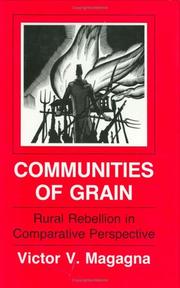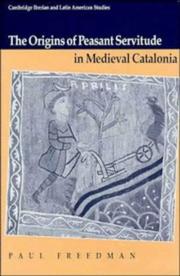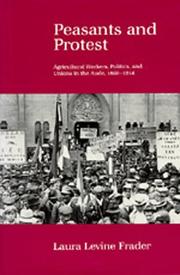| Listing 1 - 7 of 7 |
Sort by
|

ISBN: 0521400112 Year: 1991 Publisher: Cambridge Cambridge University Press
Abstract | Keywords | Export | Availability | Bookmark
 Loading...
Loading...Choose an application
- Reference Manager
- EndNote
- RefWorks (Direct export to RefWorks)
Peasant uprisings --- History. --- History

ISBN: 9780226872346 Year: 1991 Publisher: Chicago University of Chicago Press
Abstract | Keywords | Export | Availability | Bookmark
 Loading...
Loading...Choose an application
- Reference Manager
- EndNote
- RefWorks (Direct export to RefWorks)
Combining translations of five peasant narratives with critical commentary on their provenance and implications for historical study, this book illuminates the life of the peasantry in Tokugawa Japan.
Peasant uprisings --- History --- Japan --- Peasants --- Rebellions

ISBN: 0801423619 Year: 1991 Publisher: Ithaca (N.Y.) : Cornell university press,
Abstract | Keywords | Export | Availability | Bookmark
 Loading...
Loading...Choose an application
- Reference Manager
- EndNote
- RefWorks (Direct export to RefWorks)
Peasant uprisings --- Peasants --- Rural development --- Village communities --- History

ISBN: 2222045398 Year: 1991 Publisher: Paris : Editions du Centre national de la recherche scientifique : Diffusion, Presses du CNRS,
Abstract | Keywords | Export | Availability | Bookmark
 Loading...
Loading...Choose an application
- Reference Manager
- EndNote
- RefWorks (Direct export to RefWorks)
Peasant uprisings --- Révoltes paysannes --- History --- Sources --- Histoire --- France. --- France --- Sources.
Book
ISBN: 9732701374 9789732701379 Year: 1991 Volume: 72 Publisher: Bucuresti : Ed. Academiei române,
Abstract | Keywords | Export | Availability | Bookmark
 Loading...
Loading...Choose an application
- Reference Manager
- EndNote
- RefWorks (Direct export to RefWorks)
Peasants --- Paysannerie --- Romania --- Roumanie --- History --- Social conditions --- Charles I, 1866-1914 --- Histoire --- Conditions sociales --- Roemenië --- Roemenië. --- Peasant uprisings --- Romania - History - Peasants' Uprising, 1907 --- 20e siecle

ISBN: 0521393272 0521548055 0511097832 051158363X 9780521393270 9780511583636 9780521548052 Year: 1991 Volume: vol *2 Publisher: Cambridge: Cambridge university press,
Abstract | Keywords | Export | Availability | Bookmark
 Loading...
Loading...Choose an application
- Reference Manager
- EndNote
- RefWorks (Direct export to RefWorks)
This 1991 book describes the history of peasants in Catalonia, the wealthiest and politically dominant part of the medieval Kingdom of Aragon, between the ninth and fifteenth centuries. It focuses on the period from 1000 to 1300, when free peasants who had held property under favourable frontier conditions were progressively subjugated by their lords. Between 1462 and 1486 Catalan peasants mounted the most successful peasants' war of the Middle Ages, and achieved the formal abolition of servitude. Professor Freedman seeks to explain both the process by which servitude was strengthened over the centuries, and its eventual weakening before a direct moral and military challenge. He addresses both the causes of enserfment and the limitations on its effectiveness. The book integrates archival evidence with the theories of society elaborated by medieval jurists. Comparisons are drawn between Catalonia and other regions, and its experience is situated within a spectrum of different social and economic conditions.
Peasant uprisings --- Peasants --- Serfdom --- Révoltes paysannes --- Paysannerie --- Servage --- History --- Histoire --- Catalonia (Spain) --- Catalogne (Espagne) --- Rural conditions --- Conditions rurales --- Social history --- Peasantry --- History. --- Rural conditions. --- Révoltes paysannes --- Spain --- Serfdom - Spain - Catalonia - History. --- Peasantry - Spain - Catalonia - History. --- Catalonia (Spain) - Rural conditions. --- Peasant uprisings - Spain - Catalonia - History. --- Catalonia (Spain) - History. --- Arts and Humanities --- Serfdom - Spain - Catalonia - History --- Social history - Medieval, 500-1500 --- Peasantry - Spain - Catalonia - History --- Peasant uprisings - Spain - Catalonia - History --- Catalonia (Spain) - Rural conditions --- Catalonia (Spain) - History --- Agricultural laborers --- Rural population --- Marks (Medieval land tenure) --- Villeinage --- Forced labor --- Land tenure --- Slavery --- Servitude --- Insurgency --- Revolutions --- Peasants' uprisings --- Uprisings, Peasant --- Law and legislation --- Catalunya (Spain) --- Cataluña (Spain) --- Mancomunitat de Catalunya (Spain) --- Generalitat de Catalunya (Spain) --- Generalidad de Cataluña (Spain) --- Mancomunidad de Cataluña (Spain) --- Catalogna (Spain) --- Catalogne (Spain) --- Cathalunya (Spain) --- Katalonien (Spain) --- Diputació del General (Spain)

ISBN: 0520068092 0520909720 0585081506 9780520909724 9780520068094 9780585081502 Year: 1991 Publisher: Berkeley, California : University of California Press,
Abstract | Keywords | Export | Availability | Bookmark
 Loading...
Loading...Choose an application
- Reference Manager
- EndNote
- RefWorks (Direct export to RefWorks)
In the first decade of the twentieth century, the sleepy vineyard towns of the Aude department of southern France exploded with strikes and protests. Agricultural workers joined labor unions, the Socialist party established a base among peasant vinegrowers, and the largest peasant uprising of twentieth-century France, the great vinegrowers' revolt of 1907, shook the entire south with massive demonstrations. In this study, Laura Levine Frader explains how left-wing politics and labor radicalism in the Aude emerged from the economic and social transformation of rural society between 1850 and 1914. She describes the formation of an agricultural wage-earning class, and discusses how socialism and a revolutionary syndicalist labor movement together forged working-class identity. Frader's focus on the making of the rural proletariat takes the study of class formation out of the towns and cities and into the countryside. Frader emphasizes the complexity of social structure and political life in the Aude, describing the interaction of productive relations, the gender division of labor, community solidarities, and class alliances. Her analysis raises questions about the applicability of an urban, industrial model of class formation to rural society. This study will be of interest to French social historians, agricultural historians, and those interested in the relationship between capitalism, class formation, and labor militancy.
Agricultural laborers --- Peasants --- Socialism --- Vineyard laborers --- Labor unions --- Political activity --- History. --- History --- Paysannerie --- Socialisme --- Syndicats --- Vignerons --- Histoire --- Travailleurs agricoles --- Activité politique --- Agricultural Economics --- Business & Economics --- Agricultural workers --- Farm labor --- Farm laborers --- Farm workers --- Farmhands --- Farmworkers --- Employees --- Grape pickers --- Peasantry --- Rural population --- Marks (Medieval land tenure) --- Villeinage --- Marxism --- Social democracy --- Socialist movements --- Collectivism --- Anarchism --- Communism --- Critical theory --- Aude (Department) --- Pickers, Grape --- 19th century. --- 20th century france. --- agricultural workers. --- aude region. --- capitalism. --- class formation. --- economic transformation. --- labor militancy. --- labor protests. --- labor radicalism. --- labor relations. --- labor strikes. --- labor unions. --- left wing politics. --- massive demonstrations. --- middle class. --- peasant uprisings. --- peasants. --- political history. --- rural proletariat. --- rural society. --- sleepy vineyard towns. --- social change. --- social history. --- social issues. --- social structure. --- socialist party. --- southern france. --- vinegrowers.
| Listing 1 - 7 of 7 |
Sort by
|

 Search
Search Feedback
Feedback About UniCat
About UniCat  Help
Help News
News